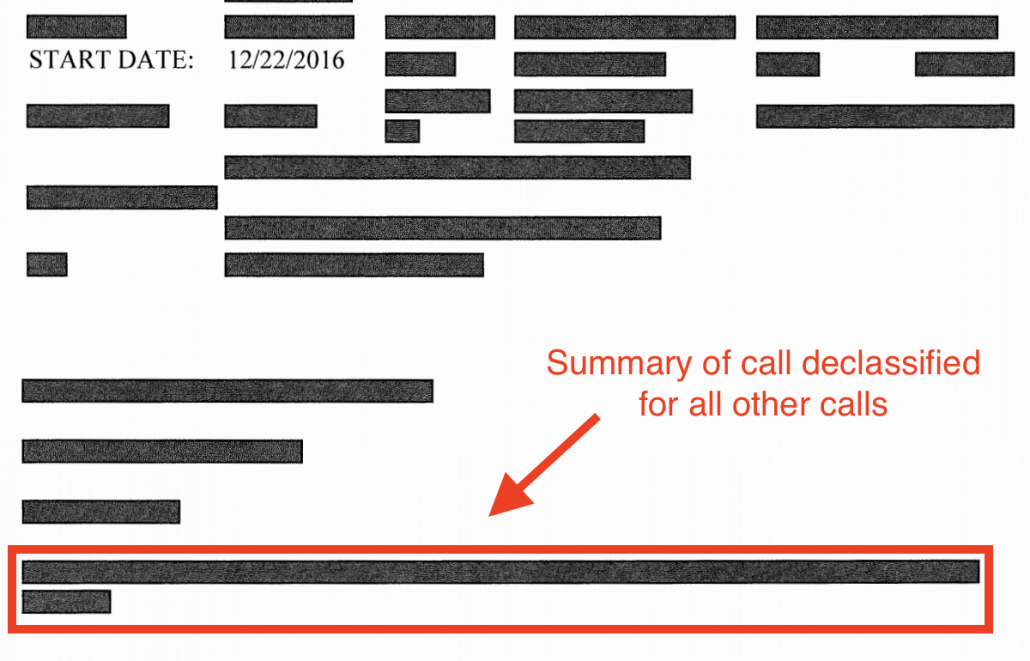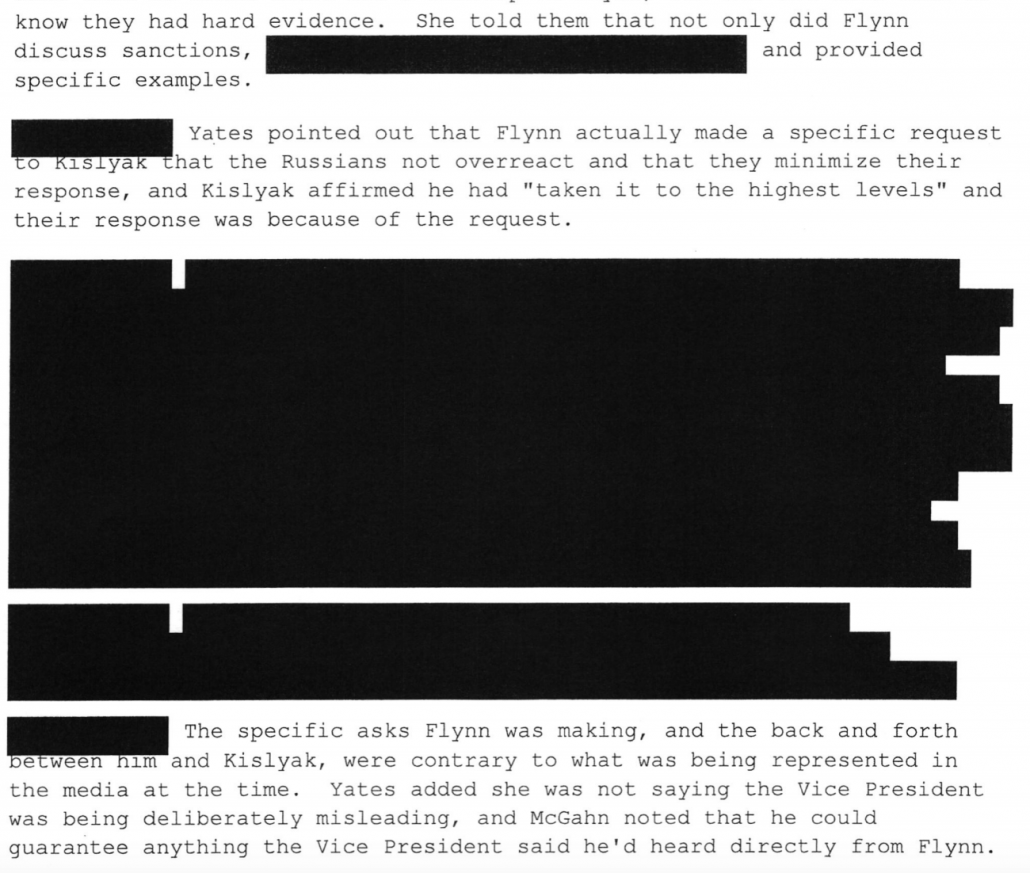Mueller Soft-Pedaled the Mike Flynn Exchanges with Sergey Kislyak about Israel
Last Friday night, John Ratcliffe released some of the transcripts of calls between Mike Flynn and Sergey Kislyak (Ric Grenell said ODNI did not have all the transcripts, and Flynn’s 302 reflects a call made on Christmas not included in this batch, though it’s unclear if there are other missing transcripts).
A lot of frothy right wingers have claimed that Robert Mueller misrepresented the call because, while Kislyak raised the sanctions against FSB and GRU officers using the word “sanctions,” Flynn instead focused on the expulsions that were part of President Obama’s sanctions on Russia responding to election interference and other Russian actions. Flynn’s Statement of the Offense treated Obama’s entire Executive Order as the “sanctions” raised in the call, so it’s a nonsensical complaint, and Flynn claimed he did not remember discussing expulsions to the FBI.
Indeed, as I have noted, Mueller actually left out the critical detail that, in Flynn’s December 31 call with Kislyak, he made it clear “the boss is aware” of details Kislyak raised in the December 29 call, making it far more likely Flynn and everyone else lied about Trump’s role in Flynn’s actions.
Plus, on the other lies which Flynn pled guilty to — the ones that virtually all Flynn’s defenders like to ignore — Mueller withheld even more damning information. When describing Flynn’s lies about his conversations with Kislyak on a UN vote over Egypt’s move to declare Israel’s settlements illegal, Mueller suggested that Flynn’s December 22 call to Kislyak was unsuccessful. He asked that Russia vote against or delay the vote, and — as the Statement of the Offense implies — Russia said they would not vote against the resolution.
a. On or about December 21, 2016, Egypt submitted a resolution to the United Nations Security Council on the issue of Israeli settlements.
b. On or about December 22, 2016, a very senior member of the Presidential Transition Team directly FLYNN to contact officials from foreign governments, including Russia, to learn where each government stood on the resolution and to influence those governments to delay the vote or defeat the resolution.
c. On or about December 22, 2016, FLYNN contacted the Russian Ambassador about the pending vote. FLYNN informed the Russian Ambassador about the incoming administration’s opposition to the resolution, and requested that Russia vote against or delay the resolution.
d. On or about December 23, 2016, FLYNN again spoke with the Russian Ambassador, who informed FLYNN that if it came to a vote, Russia would not vote against the resolution.
We can’t compare Mueller’s description of that December 22 call with what really transpired, because Ric Grenell chose not to declassify even the one-line description of what happened, much less release the transcripts.
As far as the December 23 call, it is true Kislyak warned Flynn that if sanctioning Israel came up for a vote, Russia would support the resolution.
Kislyak: … We cannot vote, uh, other than to support it.
Flynn: Okay.
Kislyak: That is something, uh, that is, uh, part of the position that we have developed, with the, um, countries in the region for a long period of time.
But what Mueller left out is that, in the December 23 follow-up, Kislyak explained that he had consulted with the “highest level in Russia,” where it was decided that Russia would help Trump delay any vote.
Kislyak: Uh, I just wanted as a follow up to share with you several points. One, that, uh, your previous, uh, uh, telephone call, I reported to Moscow and it was considered at the highest level in Russia. Secondly, uh, uh, here we are pointing [PH], uh, taking into account, uh, entirely your, uh, arguments.
Flynn: Yes.
Kislyak: To raise a proposal or an idea of continued consultations in New York. We will do it.
Flynn: Okay.
Kislyak: Uh, to give time for working out something, uh, that would be, would be, uh, less controversial. Flynn: Okay. That. .. That’s good news.
[snip]
Kislyak: But, uh, responding to your, uh, telephone call and our conversations, we will try to help, uh, to~ uh~ postpone the vote and to allow for consultations. Flynn: Okay. That’s .. that’s good.
In his January 24 interview, Flynn outright denied both that he had raised the issue with Kislyak and also that Kislyak had described a Russian response — the response that, the transcript shows, reflects a decision, “at the highest level in Russia,” to help the Trump administration in a way that would be less controversial.
The interviewing agents asked FLYNN if he made any comment to KISLYAK about voting in a certain manner, or slowing down the vote, or if KISLYAK described any Russian response to a request by FLYNN. FLYNN answered, “No.”
What Mueller kept totally secret, however, was that the first excuse Kislyak gave for his call on December 29 was to inform Flynn — and through him the President Elect — that Russia had decided they weren’t going to support Obama’s “principles for the Middle East.”
KISLYAK: Oh, General, thank you very much for calling me back. I was trying to reach you for quite a while because I have several, uh, issues to raise with you —
FLYNN: Uh huh.
KISLYAK: – rather to inform you. If you’ll allow me, one by one.
FLYNN: Please.
KISLYAK: One, uh, since you were interested in the issue of the Middle East and you called me on that issue
FLYNN: Uh huh.
KISL YAK: We wanted to convey to you and through you to the President Elect that we had uh significant reservations about the idea of adopting now the principles for the Middle East, uh, that our American colleagues are pushing for. So we are not going to support it to — in the quartet, or in the Security Council. And we have conveyed to our American colleagues. So in the spirit of full transparency I was asked to inform you as well.
FLYNN: Okay.
KfSLYAK: So it’s not something that we – Russia – are going to support.
FLYNN: Okay that’s good.
Having delivered on Flynn’s request, Kislyak then moves on to say that, since Flynn has suggested there will be a change in “Middle East principles,” Russia would like to know what the US will be doing. It’s in that context that Kislyak makes his ask: that the US participate in the Russian/Turkish “peace” discussion in Astana.
KISLYAK: Secondly~ we think it requires some additional work and everybody has to be on board.
FLYNN: Of course, Ambassador, of course. You know it does. You know it does. [Some talking over each other]
KISLYAK: And especially I think taking into account, now that US policy might uh, be changing or not, we want to understand what is going to be your policy when and if we are to implement things that we are working on.
FLYNN: Right.
KISLYAK: So the second point. it’s also on the Middle East, uh, our specialist on the Middle East say that they are very much interested in working with your specialists on these issues and if you’re available – not you personally, but your specialists – are available even before the –
FLYNN: Mmhm.
KlSLYAK: – President Elect is, has his inauguration on the twentieth, for, uh, we are perfectly available. But also, something more specific, we, uh as you might have seen, are trying uh, to help uh, the peace process in Syria. And today we announced, uh, the agreement that with Turkey and others, we are able to uh agree on and to help the Syrian sides to start working on political process. So we are thinking about an event in Astana, the capital of Kazakhstan –
Only after that (and after agreeing to a secure video chat shortly after inauguration), does Flynn raise his ask, that Russia “not uh, allow this administration to box us in” with the sanctions against Russia.
This probably explains the redacted materials in Sally Yates’ 302 about “specific asks” Flynn was making an d a “back and forth” between Flynn and Kislyak.
It also may explain why KT McFarland, at a time when she was still un-remembering the sanctions calls, likened the Israeli calls to Richard Nixon’s efforts to forestall peace in Vietnam for his own personal benefit.
Based on her study of prior presidential transitions, McFarland believed the sorts of things Flynn did were not unusual. She cited Richard Nixon’s involvement in Vietnam War peace talks and Ronald Reagan’s purported dealings with Iran to free American hostages during an incoming administration. Most incoming administrations did similar things. No “red light” or “alarm bells” went off in her head when she heard what Flynn was doing. The President-elect made his support for Israel very clear during the campaign and contrasted his position with President Obama, who he believed had not treated Israel fairly.
In any case, this, was not two separate sets of calls, with Flynn failing to sway Russian behavior the first time and succeeding the second. Rather, both times, Kislyak listened to Flynn’s request, relayed it to the “highest level in Russia,” (which can only mean Putin), and twice elicited the behavior that Flynn wanted.
Which means, on top of all the other reasons this was a counterintelligence problem, Flynn had already secretly accrued a debt to Russia, even before Trump got inaugurated.
As recently as May 7, even Bill Barr’s DOJ wanted to keep secret the full extent of Russia’s efforts to deliver whatever Mike Flynn asked for. I guess now, they’re simply going to flaunt how chummy they were with Russia even as the country moved to hold the country accountable for attacking the US.

